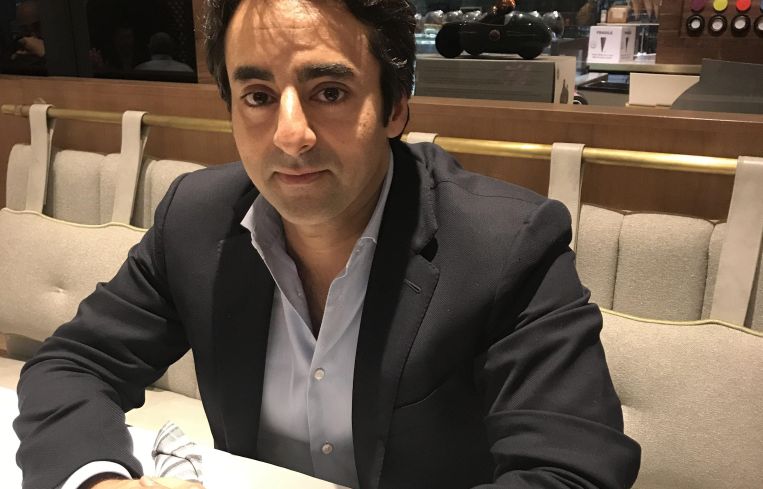CREFC 2018: Faisal Ashraf Weighs in on Lotus Capital’s New Platform
By Cathy Cunningham January 12, 2018 4:58 pm
reprints
Lotus Capital Partners has been off to the races since it launched in 2016. In addition to arranging $315 million in financing from Mack Real Estate Credit Strategies for the construction and recapitalization of Penn-Florida Companies Via Mizner—a 2-million-square-foot mixed use project in Boca Raton, Fla., last year, the firm just expanded its offerings in launching a loan sale and distribution platform.
The business will serve lenders and investors looking to de-risk and leverage their positions in whole loans, A-notes and mezzanine debt. Lotus has already closed $150 million in private placements, including three ten-year mezzanine tranches on pharmaceutical company Allergan’s new headquarters in Madison, N.J., structuring and separately placed $70 million with Hyundai Asset Management, Morrison Street Capital and Blackrock. The initiative will be led by Tim Taylor, the former head of special situations at Ten-X.
Commercial Observer caught up with Faisal Ashraf, Lotus Capital’s founder and managing partner, at the CREFC conference in Miami to learn more about the launch.
How has the conference been for you?
I’ve never seen so many happy people in my life. I found bullish sentiments all around. The only bit of frustration I found, which is a little ironic, is that people can’t get their money out fast enough.
Lotus Capital just launched a loan sale and distribution business. Talk us through why it’s the right time to launch a platform such as this.
There’s a myth that loan sale advisory is a only a countercyclical business that is needed in a downturn. We believe that there’s abundant opportunity to address the capital needs of investors generally in the whole loan format or within their current capital structures. Additionally, we characterize ourselves as the only outsourced capital markets desk in the business, which means that existing lenders can outsource, for example, the A-note distribution of their portfolios so that they can leverage yield. As you know, a big part of debt funds’ strategies is to sell off their A-notes.
So, this is a business that has little to do with a downturn but rather the existing need that investors have today and it just so happens that there’s nobody else providing it. As an example of capital structure distribution and just to test the thesis, I sold $150 million in mezz on behalf of a CMBS dealer recently. This is a very technical process, it involves negotiating inter-creditor agreements and we have to leave a certain amount of spread so that someone can still have a solid CMBS execution.
What’s the primary benefit in outsourcing the distribution?
While the biggest firms will likely continue to do things internally, not every firm has large or dedicated capital markets capability. I think that, generally speaking, a firm may use our services because they believe we carry different/deeper relationships in the capital markets, or because we have creative methods of structuring that will save them time and money. For example, we may have 5 new ideas on how to get that paper sold in the Middle East or Far East. In that regard we become an outsourced capital markets private-placement desk.
The proof point in the Allergan deal [Lotus arranged a $115 million 10-year, fixed-rate CMBS financing for Lincoln Equities Group for the new Allergan U.S. headquarters in Madison, N.J.] was that we sourced $70 million of mezzanine of which $50 million was from an investor who had never invested in the U.S. We have a series of relationships that are off-market and allow us to present some interesting solutions. We’re not the silver bullet by any means, but we can give you capital markets expertise, strong distribution and potentially attract the off-market bids from years spent running distribution desks on Wall Street. The upside to this is it allows lenders to focus on their day jobs instead of spending time doing what we do.
Where do you see Lotus Capital going from here?
My goal is for Lotus to be seen as a preeminent real estate investment banking firm—that doesn’t mean that we’ll be the biggest firm in the world, it means that people think about our firm as offering high-touch solutions with regard to intermediating capital and over time we’ll add other dimensions to the business. For now I’m pleased we are the fastest growing firm of our kind in the country –zero to $1billion in our first full year. The deals we’ve done and pace we have kept aren’t for the faint of heart.
What do you expect to see in the industry in 2018?
I see more bullishness. Like every year I expect some hiccups, but the market did a good job of shaking those hiccups off in 2017. With regard to sector-specific expectations, I do believe this will be the year that the retail sector is dealt with a little more thoroughly. I think certain investors will say, “Ok, we understand now what the have and have-nots are, and we will scale down part of our retail portfolio.” And that’s a great opportunity for Lotus to help them address that need and distribute some of that paper.



